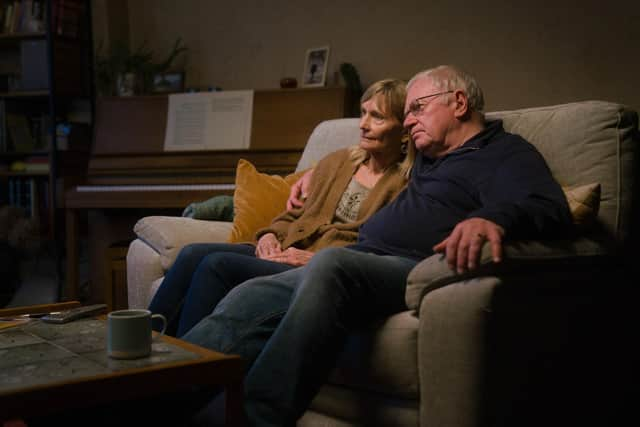It's scary, but don't delay seeking a dementia diagnosis - Ken Oxley of Alzheimer's Society
Yet long before she died, the tell-tell signs of what fate had in store were hiding in plain sight. Myself and my siblings knew something was wrong but whatever it was, we couldn’t put a name to it.
When I turned up at mum’s house to find her frustrated because the TV remote wasn’t working, only to discover she’d been trying to change channels with a cordless phone, we laughed it off. It’s just her age, I thought. But when she caught the bus into town, then came immediately home without getting off after having a panic attack, a growing sense of unease began to set in. Whatever “normal” behaviour was, this wasn’t it.
Advertisement
Hide AdAdvertisement
Hide AdI’ve been reflecting on those anxious days before mum was diagnosed with dementia a great deal this week. After almost seven years in my role at Alzheimer’s Society, I can’t recall a Dementia Action Week that has resonated so profoundly with my own experience of the condition.


This year the society is highlighting the reasons why so many people fail to obtain a timely diagnosis, and the main culprit is confusing repetitive memory problems with getting old. Just as I did with Mum.
We’ve all had senior moments – misplacing our car keys or walking into a room and forgetting why we are there.
But asking the same question over and over again is a sign that something more serious is happening, and that isn’t called getting old, it’s called getting ill.
Advertisement
Hide AdAdvertisement
Hide AdI’ve always felt a deep sense of regret – perhaps even guilt – that alarm bells about Mum’s condition did not ring sooner for me. However, Alzheimer’s Society’s latest research shows that my experience is by no means unique. A recent survey commissioned by the charity found two out of three respondents (68 per cent) across Yorkshire and Humber confused signs of dementia with getting old. As a result, almost one in four (23 per cent) of those with it battled the symptoms for more than two years before finally getting a diagnosis.
Why, you might ask, does it matter? Dementia is a progressive condition, for which there is currently no cure, so what’s the point of even bothering to get a diagnosis?
There’s no denying that a diagnosis of dementia can be daunting. However, our survey revealed more than nine in 10 people with dementia felt it was better to know. It gave them crucial access to treatment, care and support – as well as precious time to plan for the future.
To mark Dementia Action Week, Alzheimer’s Society has worked closely with leading clinicians to make the diagnosis process easier, developing a “symptoms checklist”, available on its new online hub, highlighting changes that might be due to dementia. We’re urging anyone concerned about their memory, or that of a loved one, to take the first step by visiting the hub at alzheimers.org.uk/memoryloss where they will find a useful checklist that can be printed off and given to a GP, enabling them to clearly communicate their symptoms and make the most of an appointment.
Advertisement
Hide AdAdvertisement
Hide AdThe charity has also made an emotional film showing how the symptoms of dementia, such as asking the same question repeatedly, can easily be dismissed as a sign of old age.
This is not the only reason people worried about their memory put off a visit to their GP. In my years with Alzheimer’s Society, I’ve spoken to countless people who admit they suspected for quite some time that all was not well, but simply did not want to confront it. So, denial is an issue too, along with a reluctance to visit a GP for fear of being given bad news. Across the UK diagnosis rates are now at a five-year low and tens of thousands of people are living with undiagnosed dementia.
No one wants to be told they have a progressive and incurable condition. And yet, I have lost track of the people who have told me it came as a relief to know – to finally have an explanation for the way they were feeling.
I’ve been in the job long enough, also, to know people can – and do – live well with dementia. Some do remarkable things – setting themselves new challenges, fulfilling lifelong ambitions, or simply spending more quality time with the people who matter to them.
Advertisement
Hide AdAdvertisement
Hide AdA diagnosis can open the door that allows them to live more fulfilled lives, for longer. Taking that all important first step is never easy, but support and information is just a phone call or a click away. Visit alzheimers.org.uk/memoryloss or call our support line on 0333 1503456.